The Future JERA Offers the World: A New Relationship between Decarbonization and Thermal Power
26 February 2024
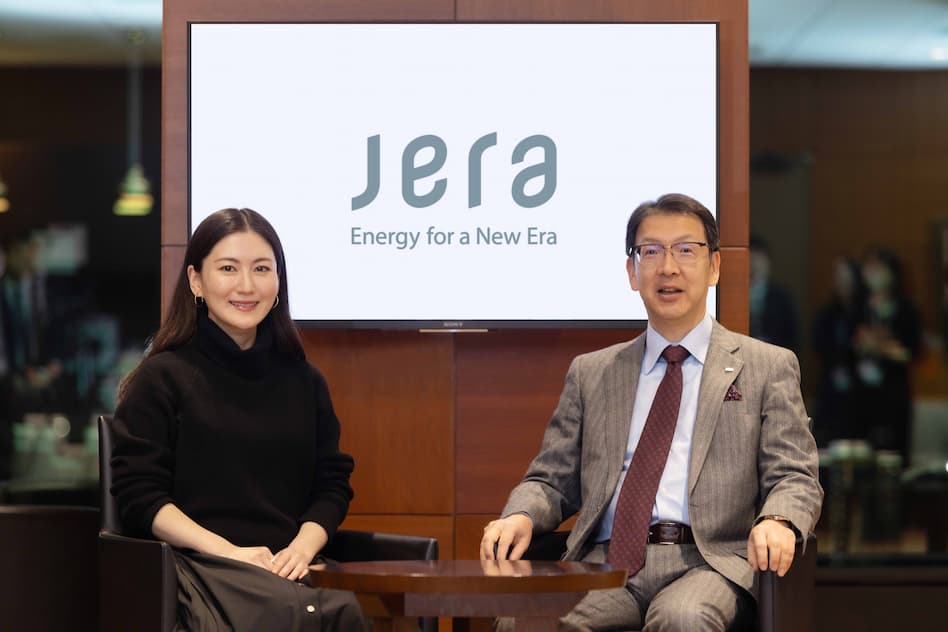
Even as decarbonization moves forward globally, Japan continues to use fossil fuel-based thermal power generation. Why is this? And how is Japan working to decarbonize? Ayako Tanaka, the globally renowned soprano singer based in Vienna, Austria, interviewed JERA President, Director, CEO, and COO Mr. Hisahide Okuda.
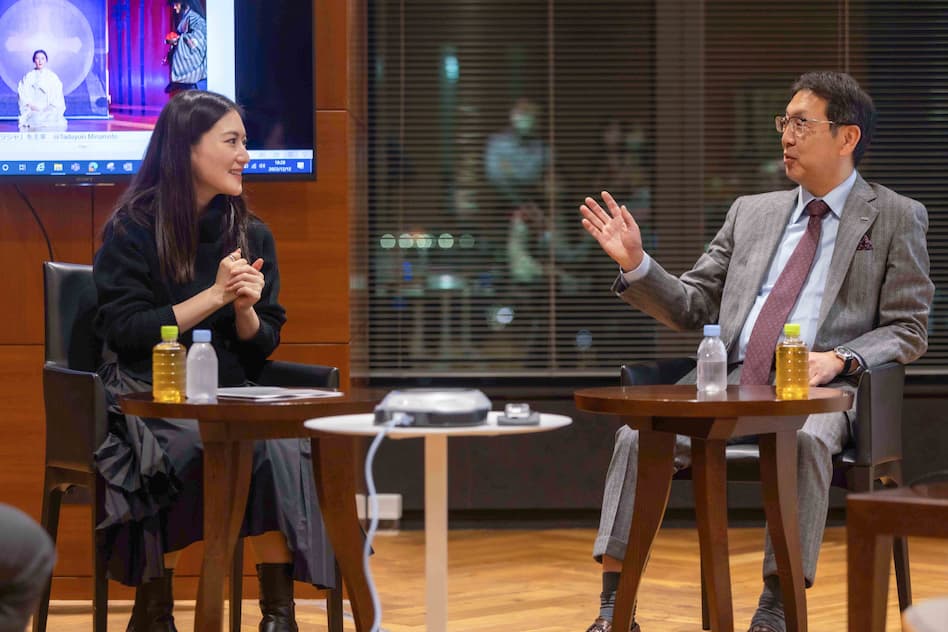
Is Japan a Renewable Energy Laggard?
Austria, considered a leader in decarbonization, has set goals such as achieving net-zero greenhouse gas emissions by 2040 and meeting all domestic electricity needs with renewable energy by 2030. Living in such a country, it's no surprise that Ms. Tanaka questions Japan's continued operation of coal-fired power plants.
The breakdown of Japan's electricity generation for fiscal 2022 is as follows:
・Nuclear power: 5.6%
・Renewable energy: 21.7%
・Fossil fuel-fired thermal: 72.7%
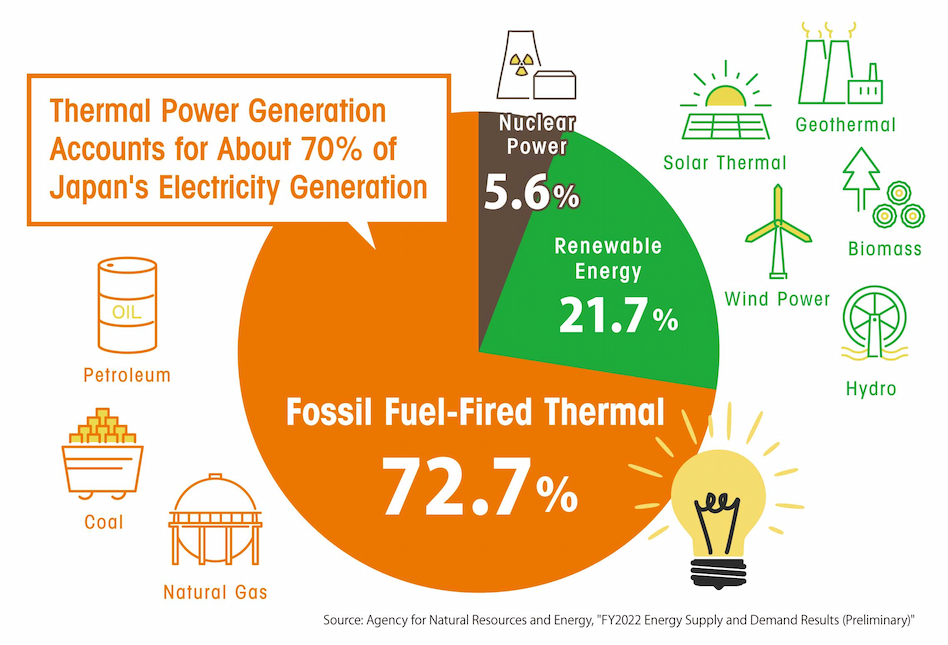
(Source: Agency for Natural Resources and Energy, "FY2022 Energy Supply and Demand Results (Preliminary)")
About 70% of the electricity generated in Japan is actually thermal power produced by burning fossil fuels. In this context, Ms. Tanaka had a question for CEO Okuda:
Tanaka: Living in Europe, and especially in Austria, I don’t really have a negative impression of electricity generation. That's because they don't use coal-fired thermal or nuclear power and about 70% of their electricity comes from renewable sources. Of course, since the population is smaller than Japan’s they don’t need to generate as much power, but why can't Japan make greater use of renewables, too?
Okuda: We tend to think of Japan as lagging behind the rest of the world when it comes to the use of renewable energy, but that's just not the case. Take solar power, for example. Continental nations like the United States and China may be way ahead in terms of simple generation capacity, but Japan is actually among the top in the world in terms of penetration rate.
According to research by the Agency for Natural Resources and Energy, Japan has the highest installed solar power capacity per unit of land area (kW/km2) among major countries at 175, followed by Germany at 165, the UK at 57, China at 32, France at 27, Spain at 30, India at 16, and the United States at 12. Furthermore, solar’s share of total electricity output in Japan is 8.3%, second only to Germany's 8.5%.*
* Source: Agency for Natural Resources and Energy, “Japan’s Renewable Energy Policy” (21 June 2023)
Okuda: There are a variety of ways to generate renewable energy, such as solar, wind, and geothermal. Which way is best? Well, it differs from country to country. This may be obvious, but some countries are windy and others are not. Some have long hours of sunlight while the days are short in others. Countries with hot springs can take advantage of geothermal energy, but not all countries do. The best approach is for each country to decide which forms of energy it should use by looking at what resources they have at hand. Instead of everyone taking the same approach to decarbonization, it's more important that each country identifies which methods suit it best and then gets to work.
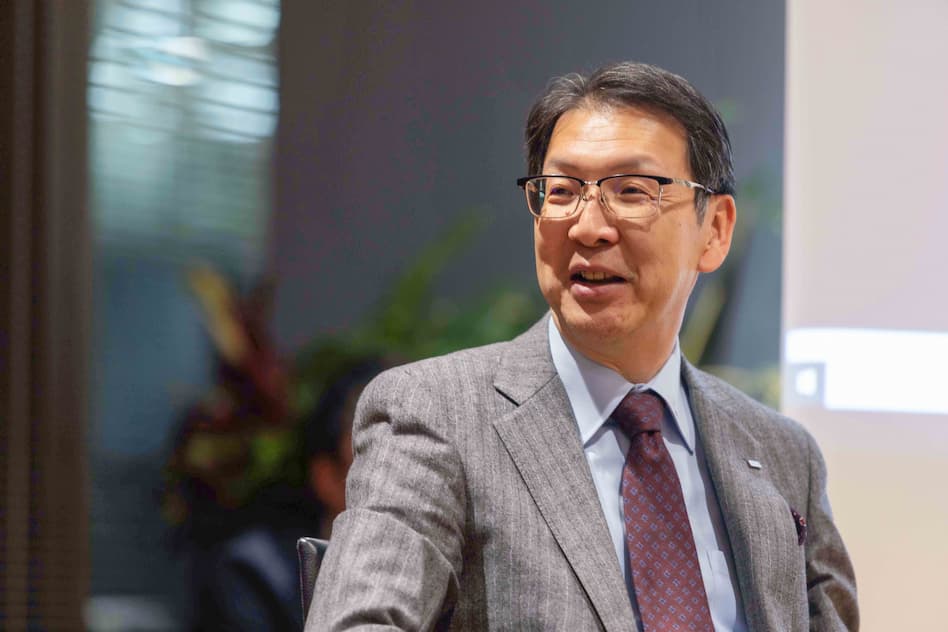
When you talk about renewable energy in Japan, most people immediately think of solar power. Japan actually has one of the highest solar penetration rates in the world. In Europe, however, wind power is thriving. The reason is that the prevailing westerlies carry strong, stable winds to Europe throughout the year. In Austria, where Ms. Tanaka lives, hydroelectric power accounts for more than half of the electricity generated. As these examples show, the use of renewable energy is greatly influenced by the natural conditions in each country.
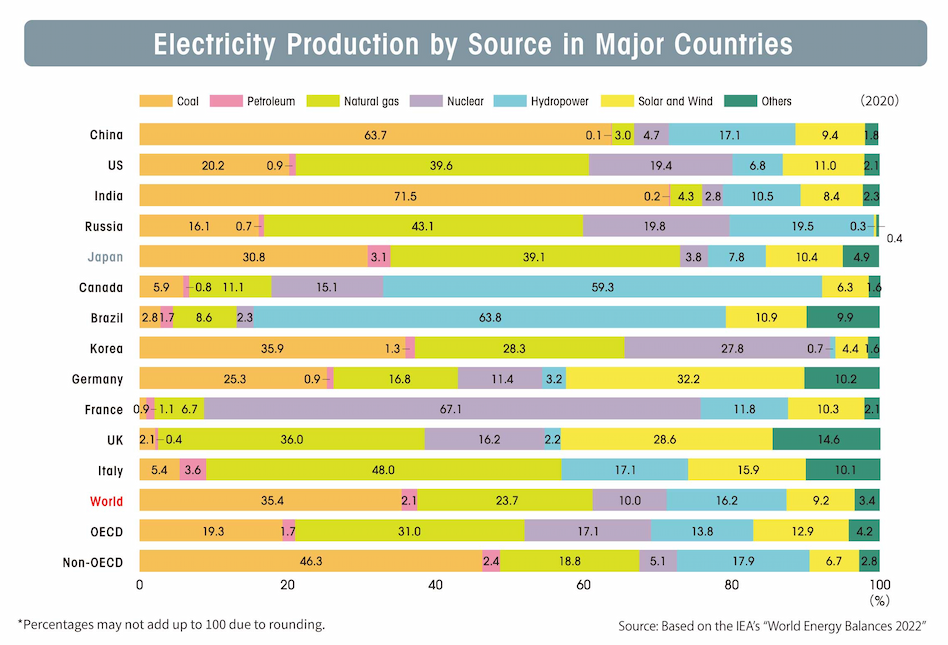
The Goal Is Not 100% Renewable Energy, but Zero CO2 Emissions
Okuda: In Europe, they have a basis for setting a target of 100% renewable energy. When we look at the state of energy resources in Japan, however, it becomes clear that it would be difficult to meet all of this country's electricity needs through renewable energy alone. Our proposal at JERA, therefore, is to work on decarbonization by combining renewable energy with a variety of other methods.

The core of this proposal is something JERA is working on right now: JERA Zero CO2 Emissions 2050. Until now, thermal power generation has always involved burning fossil fuels and emitting CO2. JERA, however, aims to substitute ammonia or hydrogen for fossil fuels—generating the same amount of electricity while reducing CO2 emissions by the proportion substituted—ultimately achieving zero-emissions thermal power that uses 100% ammonia or hydrogen as fuel.
In 2024, demonstration testing at Hekinan Thermal Power Station in Aichi Prefecture will generate electricity using 80% of the fuel coal currently used and replacing the remaining 20% with ammonia. Later, the proportion of ammonia will gradually be increased until we ultimately achieve thermal power generation in which only ammonia is burned. In the same way, for thermal power generation using LNG (liquefied natural gas), we plan to gradually transition to hydrogen as we ultimately aim to generate electricity using hydrogen alone. At the same time, we will also be expanding our adoption of renewables as much as we can. Through a combination of zero-emissions thermal and renewables, the company is taking on the challenge of achieving net-zero CO2 emissions in its domestic and international operations by 2050.
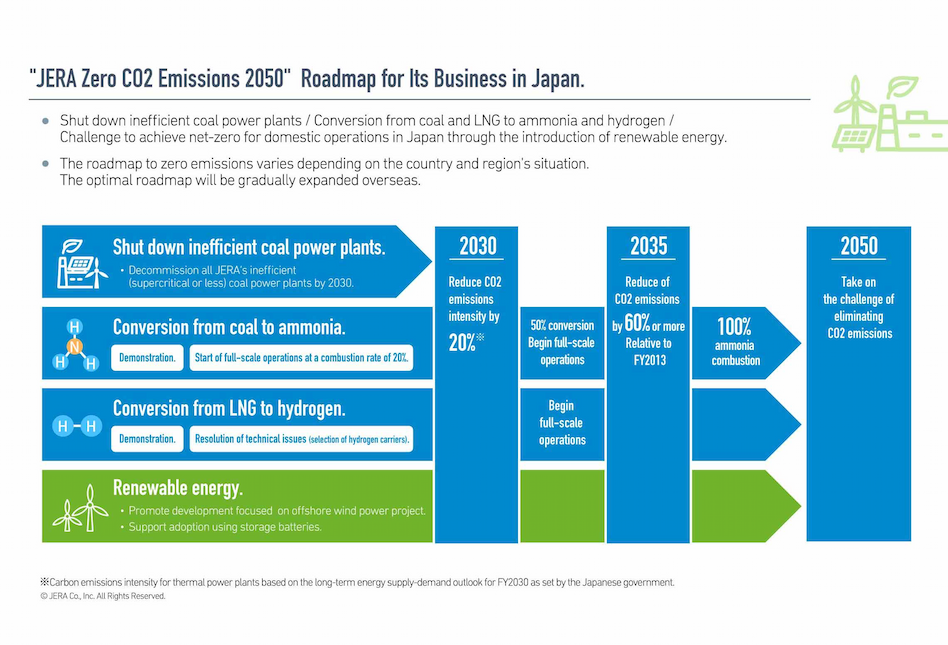
Okuda: Aiming for 100% renewable energy is certainly a wonderful solution, but we believe that creating a greater variety of options will make it easier for each country or region to pursue decarbonization in ways that suit its specific circumstances.
Tanaka: I think that’s a very Japanese, very wonderful approach. I wonder if the Japanese approach to religion plays a role in such thinking. Japanese people go to Christian churches on Christmas and pray at Shinto shrines and Buddhist temples to mark the New Year. Rather than consider one set of values to be absolute, they embrace various perspectives. I think it's lovely to be able to adopt such an approach naturally. I can see now that Japan has its own unique, flexible approach to the energy issue, one not found in Europe.
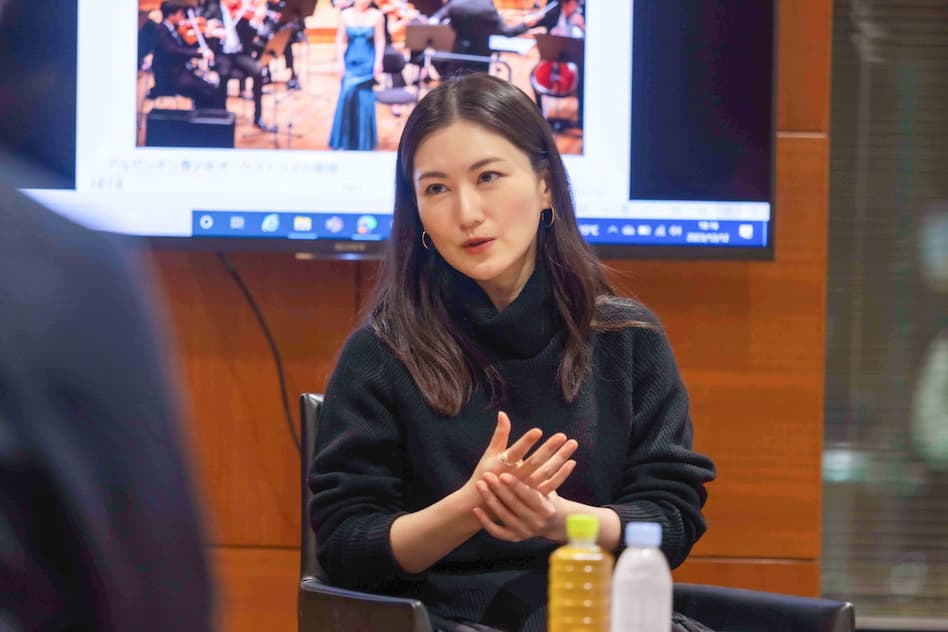
Okuda: There isn't necessarily one correct answer. The world is made up of many countries and regions, and they embrace different values. And of course, their natural conditions vary, too. Given this reality, I think it would be harder to believe that a one-size-fits-all approach could work perfectly everywhere. There are cultural barriers in different countries and regions that just cannot be overcome. Cherishing the values of each, we want to solve problems using whatever approach suits each situation. This is the kind of culture we hope to develop.
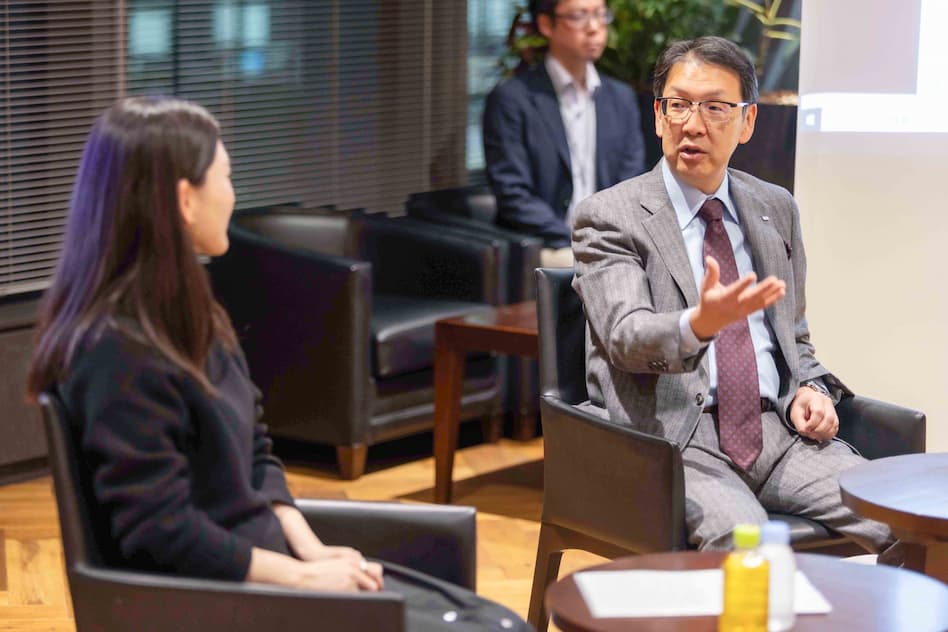
CEO Okuda described JERA's aspirations for achieving a decarbonized society. This is not mere idealism, though, but a concrete, realistic roadmap that reflects the realities of Japan and the world. JERA's efforts are certainly not aimed at prolonging thermal power that relies on fossil fuels. They represent an innovative challenge, one that it is no exaggeration to say holds the key to significantly accelerating global decarbonization.
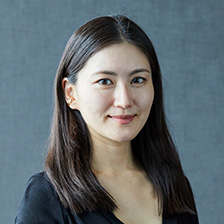
Ayako Tanaka
Soprano singer
President, Japan Association for Music Education Program
At the age of 18, Tanaka traveled to Vienna alone to study. At 22, she made her debut at the Stadttheater Bern in Switzerland, becoming the youngest soloist ever in the theater and the first Japanese person to perform there. Since then, she has performed in Vienna, London, Paris, Buenos Aires, and many other cities worldwide. Tanaka won “Best World Premiere Piece” by the Argentine Music Critic Association for her performance of Esteban Benzecry's “The 5 Cycle Songs for Coloratura Soprano and Orchestra" in Buenos Aires. The album received five stars from the BBC Music Magazine, the world's best-selling classical music magazine.
Tanaka is also engaged in giving back to society through activities such as the SCL International Youth Music Festival held in Vienna with the support of UNESCO and the Austrian government to assist young performers, as well as the National Youth Orchestra of Argentina, which was established with the support of the Argentine government to provide education to young people of various backgrounds and family situations through music.
Tanaka was named one of Newsweek's "100 Most Respected Japanese in the World" in 2019. She sang the Japanese national anthem on October 22 at the opening ceremony of the SMBC Nippon Series 2022. Born in Kyoto, Tanaka lives and works in Vienna.
RELATED STORIES

Front Lines of Thermal Power Generation Where Electricity Is Born for Our Everyday Life.
Ichihara City and Futtsu City in Chiba Prefecture face Tokyo Bay. Both cities are home to JERA's world-class thermal …

Challenging the Skepticism of Green Countries: The Reality of Ammonia as a Fuel Source
A variety of solutions to combat global climate change are being pursued around the world.

The future of energy starts here! JERA lights the fire of hope for decarbonization
The company is about to take a new step forward at Hekinan Thermal Power Station in Hekinan City, Aichi Prefecture.

